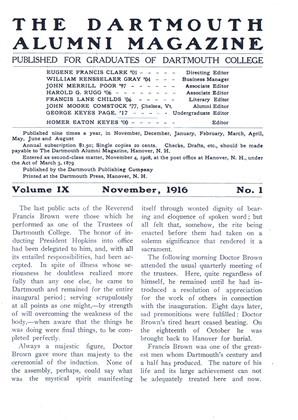Democracy is a very precious thing to us who wish to live our own lives with the minimum of outside interference. But it is possible to defeat the very ends for which it exists if we concede the utmost claims of individualism which have been urged to such extremes. It is important for the college at this point to study the type of its accomplishment and to understand the change which the needs of the immediate future must work in its methods if it is to make its vital contribution to meet these needs. In training for leadership its influence in years past, unconsciously perhaps, has been to set college men apart in the communities in which they have lived. The requirement now is emphatically the reverse. At a time when, almost without exception, the college man went into a profession, and when the professional man was inevitably a college man, the leadership of the community gravitated towards its advisers, who were the ministers, lawyers, doctors and teachers,—in short, the college men of the community. These men were necessarily individual workers, and it came to be that the stamp of college training, as a matter of course, implied individualism. But whether it be that business and industry began to summon the men from institutions of higher learning, or that college men began to seek careers in the field of production and distribution, the change has been wrought very quickly that the men going into the professions from our colleges are far outnumbered by those seeking the newer career.
Figures prepared at Dartmouth a decade ago show that, for the first twenty-five years of the College, 40 per cent of its graduates entered the ministry; 25 per cent entered the law; 12 per cent entered teaching; 7 per cent entered medicine; 16 per cent were untraceable. For the first fifty years the legal profession led with 36 per cent; the ministry was second with 30 per cent; and only 10 per cent, classed as untraceable, have the possibility of having been outside the professions. In the half decade from 1900 to 1905, 52 per cent of Dartmouth's graduates went into business and industry, and that figure has increased until, from 1909 to 1913, it runs above 60 per cent. Like changes, in varying degree, have been going on in other colleges.
All this requires definite modification of some of the theories about individualism as compared with group action; for cooperation is the basis of accomplishment outside the professions, and in ever increasing degree within them. Thus individualism that either fails of ability or interest to express itself through helpful influence on group action is, at the best, of restricted worth; and, at the worst, is positively pernicious. Individual success attained for selfish ends is an unworthy goal for the colleges to set for their men, but the colleges are not entirely free from indictment on this count. The brilliancy of the halo which has been set about the theory of individualism and all that it implies, in some of our college teaching, has been too often responsible for dulling in the student's mind the conception of the beauty of service. The way must be found to stimulate the desire of our student bodies for supreme service within the group rather than outside it. The inscription in the Worcester County Courthouse, in Massachusetts,—"Here speaketh the conscience of the State, restraining the individual will,"—could well be placed, with slight adaptation, in our academic halls, and made descriptive of one great function of the college.
We have as a people specialized so completely in recent years on claiming rights, that our senses of obligation and responsibility have become atrophied. Authority has been weakened, not only in state and church but in home and school, until it commands, less respect even than obedience. Amid all this, somehow, the conviction has begun to grow that dilettante philosophizing about rights, and claims to opportunities which have not been earned offer too little compensation in constructive accomplishment for what society is called upon to sacrifice in the character of the individuals who compose it, through their being so little called upon to acknowledge any authority of any kind whatsoever.
 View Full Issue
View Full Issue
More From This Issue
-
 Article
ArticleThe last public acts of the Reverend Francis Brown
November 1916 -
 Class Notes
Class NotesCLASS OF 1912
November 1916 By Conrad E. Snow -
 Class Notes
Class NotesCLASS OF 1912
November 1916 By Conrad E. Snow -
 Class Notes
Class NotesCLASS OF 1912
November 1916 By Conrad E. Snow -
 Class Notes
Class NotesCLASS OF 1910
November 1916 By Sturgis Pishon -
 Class Notes
Class NotesCLASS OF 1910
November 1916 By Sturgis Pishon








